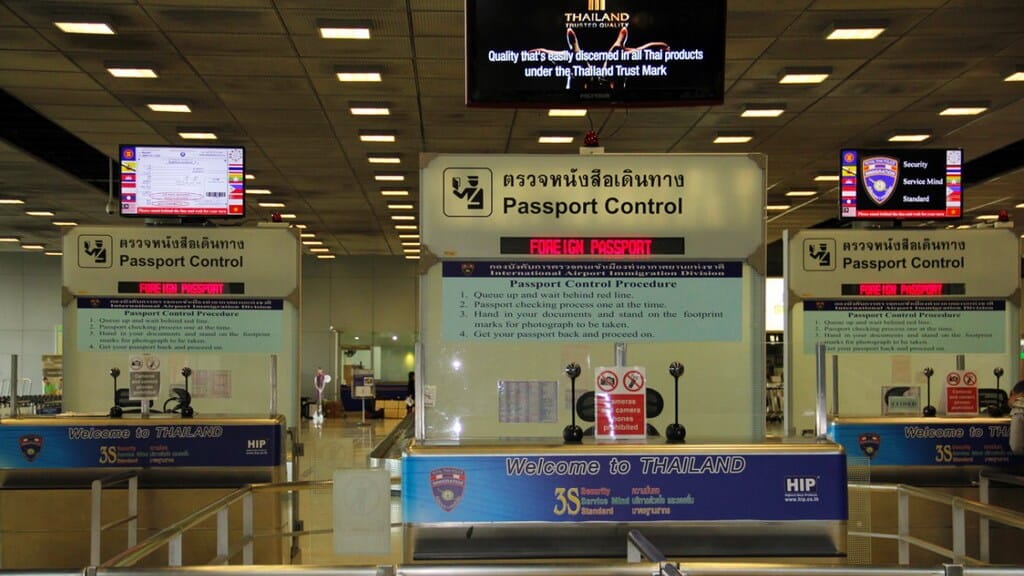
What you can and can't bring into Thailand: A complete guide for travelers


Real Estate Specialist
Welcome to Thailand, a magnificent country with beautiful beaches, rich culture and amazing cuisine. If you are planning to visit this exotic country, you need to know which goods can be imported into Thailand and which are prohibited. Customs regulations play an important role in ensuring the safety and well-being of the country, so it is extremely important to comply with them.
In this comprehensive guide, we will tell you about the basic rules for importing into Thailand, permitted and prohibited goods, and restrictions on importing certain categories of goods. We will also detail the customs inspection process, customs fines and penalties, and give you useful travel tips.
Basic rules for importing into Thailand
General customs regulations
When planning a trip to Thailand, the first thing to consider is the strict customs regulations. Upon entering the country, every traveler must fill out a customs declaration form that specifies all imported goods. This applies to both new purchases and personal items that may seem mundane but fall under certain regulatory categories.
Description of free importation of personal belongings
Personal items that are not for sale and will be used during your stay are usually allowed to be imported without additional duties. However, it is worth remembering that there are restrictions on quantity and value.
For example, clothing and personal hygiene items that you plan to use during your trip are allowed in reasonable quantities. This means that you can bring enough items for daily use appropriate to the length and conditions of your stay. As a rule of thumb, for a two-week vacation, it is reasonable to take about 3-4 sets of casual clothes, a couple of evening outfits, and necessary accessories such as hats, sunglasses, and bathing suits.
In terms of value, Thai customs regulations do not impose strict limits on the value of personal items you bring in for your own use, unless they are for sale. However, if the total value of your new or high-value items, such as electronics or jewelry, exceeds US$10,000, it is advisable to notify customs authorities in advance and fill out the appropriate declarations if necessary to avoid possible delays and tax issues.
It is always a good idea to have documents on hand to prove the value and origin of expensive items, especially if they are likely to attract the attention of Customs, such as high-end photographic equipment, laptops or expensive jewelry. This will help confirm their personal use and avoid unnecessary compliments when going through customs control.
Limits on goods: alcohol, cigarettes, foodstuffs
Among the particularly regulated categories of goods in Thailand are alcohol and tobacco products. Adult travelers are allowed to import no more than 1 liter of alcoholic beverages. This can be, for example, bottle of wine or spiritsThe cost, depending on the brand and manufacturer, ranges from $15 to $100 and up. As for tobacco products, then up to 200 cigarettes or 250 grams of tobacco are allowed. The cost of a pack of cigarettes varies depending on the country of production and can range from 1 to 5 US dollars per pack.

When it comes to foodstuffsThailand imposes strict import restrictions on fresh fruits, vegetables and meat products. These measures are taken to prevent the spread of diseases and pests that could harm local agriculture and the ecosystem. Importation of these products is often prohibited, but if it is allowed, it requires proper phytosanitary certificates and detailed inspections. If you do decide to bring packaged foods, such as canned or dried foods, make sure they meet local standards and regulations, and that their value and quantity do not raise suspicion among customs officials.
Customs declarations: when to fill in and how to fill in correctly
When entering Thailand, every traveler is required to fill out a customs declaration form. This is an important document that can be filled out on the plane or immediately upon arrival at the airport. The declaration must include all goods you are bringing with you, including personal items, gifts and souvenirs.
It is important to state the value of each item you are importing in US dollars. For example, if you are bringing electronics such as a camera worth about $500 or a laptop for about $1000, these amounts should be clearly stated on your declaration. Also, if you are bringing gifts whose total value exceeds $300, this should also be noted.
Filling in the customs declaration form incorrectly can lead to a number of unpleasant consequences. If discrepancies are found, you may be detained for additional inspection, which will take additional time. In addition, fines may be imposed for failing to declare goods or under-declaring their value. In Thailand, fines for such violations can vary, but often amount to double the value of the undeclared goods. In extreme cases, goods that have not been correctly declared may be confiscated.
To avoid these situations, follow some simple rules:
- Before traveling, prepare a list of all the things you plan to bring in and estimate their value.
- Make sure you have documentation to prove the cost of expensive items, such as invoices or receipts.
- If you are not sure whether you need to declare an item, it is better to specify it in the declaration. This approach will help you avoid possible problems at customs.
Following these simple guidelines will help you get through customs in Thailand quickly and smoothly and enjoy your trip.
What you can bring into Thailand
| Product Category | Details and limitations | Estimated quantities or costs |
|---|---|---|
| Personal belongings and clothing | Permitted for importation without restriction if intended for personal use. | Unlimited, consistent with the length of the trip. |
| Electronics | Laptops, phones, cameras are allowed for personal use. A declaration is required for expensive devices. | Up to 2 devices of each type; declare devices costing more than $500. |
| Gifts and souvenirs | Allowed for importation, but their value and quantity must be in accordance with the established limits. | The total cost shall not exceed $600. |
| Permitted foodstuffs | Packaged and canned foods that meet local safety standards. | Up to 10 kg of packaged food. |
In the following sections, we take a closer look at the prohibited categories of goods and provide tips on how to avoid problems at customs.

What you can't bring into Thailand
The table below summarizes the main categories of prohibited goods to be imported into Thailand, as well as the possible consequences of their illegal importation:
| Product Category | Description and Limitations | Potential penalties and consequences |
|---|---|---|
| Drugs | Importation of drugs is strictly prohibited without exception. | Imprisonment from 1 year to life, fines up to $100,000. |
| Weapons and explosives | Importation is prohibited without special authorization from the Thai authorities. | Imprisonment up to 10 years, fines up to $60,000. |
| Medicines | Importation with a prescription or medical certificate is allowed. Some drugs require special authorization. | Penalties for non-declaration or importation without authorization up to $10,000. |
| Pirated products | Importation of unlicensed copies of media and software is prohibited. | Confiscation of goods, fines up to $5,000. |
| Animals and plants | Importation without proper permits and quarantine is prohibited. | Fines and possible confiscation of animals/plants. |
| Cultural and historical artifacts | It is prohibited to import or export without authorization. This includes antiques and artifacts. | Fines and possible criminal prosecution. |
This data emphasizes the importance of careful preparation and compliance with Thai customs regulations to avoid serious legal consequences. Before traveling, it is advisable to additionally check for up-to-date information on official resources or consult with professionals in the field of customs regulations.
Customs inspection process
How to clear customs at airports in Thailand
When you arrive at an airport in Thailand, the customs clearance process begins as soon as you receive your luggage. Here are some additional tips and information to help you better prepare and simplify the customs clearance process:
- Preparation of documents: Make sure you have all your documents, including your passport, visa (if required), tickets and customs declaration ready to present. Keep them handy to avoid delays at checkpoints.
- Green and red channels: Most airports in Thailand have two channels - green (nothing to declare) and red (something to declare). If you have no goods to declare, you can go through the green channel. However, if you have goods to declare or you are unsure, you should choose the red channel.
- Baggage inspection: Customs officers may search your luggage. Be prepared to open your suitcases and show the contents. It is helpful to pack in such a way that you can easily access any items that may raise questions from customs.
- Customs questions: Customs officers may ask you questions about your visit, the purpose of your trip and the contents of your luggage. Answer honestly and clearly. Untruthful answers may lead to additional checks or even legal consequences.
- Electronic devices: You may be asked to turn on electronic devices such as smartphones, tablets, or laptops to check if they are working properly. Make sure all devices are charged.
- Prohibited and restricted goods: If you are not sure whether a particular item is allowed to be imported, it is best to check in advance with the official Thai Customs website or a Customs consultant.
Following these tips will help ensure a faster and less stressful customs clearance in Thailand, allowing you to start your trip off on a positive note.

Tips for completing a customs declaration
To simplify the process of clearing customs in Thailand and minimize the risk of problems, here are some additional tips for completing the customs declaration form:
- Prepare in advance: Before boarding your flight, review the list of goods that require declaration and have all the necessary information ready. This will help you to complete the declaration quickly and accurately during the flight or upon arrival.
- Use the official exchange rate to recalculate the cost: Use the official Thai currency exchange rate when declaring the value of goods on the declaration form. This will ensure accuracy and avoid possible questions from customs officials regarding the conversion of value.
- Detail the description of the products: Instead of general phrases such as "souvenirs" or "gifts", provide a more specific description of the goods, such as "handmade woodwork", "silver jewelry" or "ceramic ware". This will help Customs better understand the nature of the items you are importing.
- Take pictures of your valuable purchases: For high-value goods, such as jewelry or electronics, it is useful to have photographs that confirm their condition and completeness at the time of importation. This can be useful in case of disputes at customs.
- Keep receipts and proof of purchase: If possible, keep all receipts or purchase documents for the goods you declare. This may be necessary to confirm the value of the goods, especially if they are new or seem expensive.
- Consult customs authorities when in doubt: If you have doubts about whether certain goods should be declared or whether the declaration should be filled out correctly, do not hesitate to seek advice from Customs at the airport. It is better to clarify all questions in advance than to face problems at the last moment.
Following these recommendations will not only speed up the customs clearance process, but will also help you avoid potential fines or confiscation of goods.
What to do if you have problems importing your belongings
If you're having trouble bringing things in during customs inspection in Thailand, here are some helpful steps to help you navigate the situation:
- Remain calm and polite: Your behavior can play a significant role in resolving the situation. Communicating calmly and respectfully with Customs officers increases the chances of a favorable outcome.
- Provide the required information: Be prepared to explain the origin and purpose of your items. If you have relevant documents or evidence, show them. This may include purchase receipts, prescriptions or certificates.
- Ask for clarification: If you are unclear about the reasons for the problem, ask Customs officers to clarify exactly what rules have been violated. Knowing the specific details will help you better understand the situation and determine the next steps.
- Use an interpreter: If you do not speak Thai, request the assistance of an interpreter. This will help avoid misunderstandings and ensure that all parties understand each other correctly.
- Get legal help: In case of serious violations or if you feel that your rights have been violated, it is advisable to consult a legal counselor. A legal advisor will help you protect your rights and provide you with information on the best course of action in the situation.
- Pay fines if necessary: If you are given a fine, make sure you understand exactly what the fine is for and what the terms of payment are. Paying fines on time can help you avoid additional problems.
- Follow customs instructions: If your items are confiscated, clarify the process for returning them (if possible) or destroying them. Understanding the process will help you determine if there is anything you can do to get your items back.
- Document the entire process: Keep copies of all documents related to your case, including customs forms, penalty receipts and any legal documents. This may be useful for future reference or as evidence in case of disputes.
Following these guidelines will help minimize stress and potential losses when you encounter problems with customs in Thailand.
Tips for travelers
Preparing for travel: checking the list of authorized items
Before you travel, make sure you know what goods are allowed into Thailand and what the restrictions are. This will help avoid problems at customs and make your stay more enjoyable. Visit the official Thai Customs website or the Thai consulate in your country for up-to-date information on customs regulations. It is also a good idea to print out a list of permitted and prohibited goods to have on hand when packing.
Tips for safe transportation of authorized items
Pack all authorized items so that they are easily accessible for inspection at customs. Use clear bags for small items and proof of legitimacy. This will not only speed up the inspection process, but also reduce the likelihood of damage to your items. It is especially important to pack electronics and liquids well, following airline regulations.

How to properly transport valuables and documents
Use secure bags or suitcases with locks to carry valuables and documents. Always carry important documents and valuables in your hand luggage to avoid loss or theft. Consider using special hidden pockets or money belts that can be worn under clothing for added security.
What to do if your luggage is lost or confiscated at customs
In case of lost baggage, contact the airport's lost baggage service immediately. If your belongings have been confiscated at customs and you believe this to be a mistake, seek clarification from customs authorities and, if necessary, seek legal advice. It is important to have all documents to prove your case, such as shopping receipts or certificates. In case of confiscation, clarify the appeal procedure and possible timeframes for returning the goods.
Conclusion
Traveling to Thailand can be one of the most memorable experiences of your life, thanks to its rich culture, delicious cuisine and friendly people. However, to ensure that your adventure goes smoothly, it is important to prepare thoroughly and familiarize yourself with Thailand's customs regulations beforehand. Learning what you can and cannot bring into the country will help you avoid unpleasant surprises at the border and allow you to enjoy your stay hassle-free.
Remember that following customs regulations will not only protect you from possible fines and legal problems, but will also show your respect for the laws and culture of the country you are visiting. Always declare all items specified in the regulations and follow the recommendations of official sources and this guide.
If you have any questions or require assistance during your visit to Thailand, do not hesitate to contact customs officers or local authorities. They will provide the necessary information and support to make your stay safe and enjoyable.
We hope this guide will be helpful in your preparation for your trip to Thailand. Happy travels and unforgettable experiences!
Yes, you can. The limit is 1 liter of alcohol per adult.
You can bring in up to 200 cigarettes (one carton) or 250 grams of tobacco products.
Meat products, cheeses, certain fruits and vegetables are prohibited without special authorization.
Personal medications are allowed in reasonable amounts, but some require a prescription.
Personal electronics are allowed duty free unless it is a commercial quantity.
Can I bring alcohol into Thailand?
Yes, you can. The limit is 1 liter of alcohol per adult.
What is the limit on importing cigarettes?
You can bring in up to 200 cigarettes (one carton) or 250 grams of tobacco products.
What products are prohibited to bring into Thailand?
Meat products, cheeses, certain fruits and vegetables are prohibited without special authorization.
Can medications be brought in?
Personal medications are allowed in reasonable amounts, but some require a prescription.
Are there restrictions on electronics?
Personal electronics are allowed duty free unless it is a commercial quantity.






















